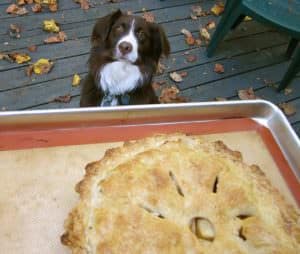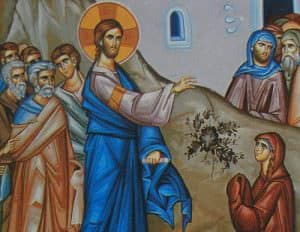Even the puppies
“It is not fair to take the children’s food and throw it to the dogs”
“Yes, Lord, yet even the dogs eat the crumbs that fall from their master’s table”
We hear Jesus’ exchange with the Caananite woman—or as it sometimes is, the Syrophonecian woman. Maybe it troubles you, suggesting as it does a rather mean-spirited attitude towards foreigners, like the woman who is kneeling before Jesus. This isn’t what we like to believe of our Lord. But, perhaps, things aren’t what they seem.
“It is not fair to take the children’s food and throw it to the dogs”. The Gentiles were derisively called dogs; perhaps you know that in 1 Samuel Goliath says to David, “Am I a dog, that you come at me with sticks?” Indeed so.

This episode in Matthew’s telling is, I suggest, really about mercy to outsiders. The Caananite woman, though she is not a child of Israel, is nevertheless worthy of care and attention because she has trust in God: and, as we hear, by her trust her daughter is healed.
But I want to take something of a more roundabout route, and concentrate on what seems to be the original version of this story in Mark’s gospel. That episode is almost identical to this one, but for one detail: Jesus goes into the woman’s house, quite intentionally—an audacious thing, given the Pharisaic prohibition on going under foreign roofs. He comes to her house, having journeyed from the seaport of Genessaret, which was something of a gate to the badlands, the foreign lands where people had strange and unholy customs. He travels a long arc to the north-west, close to the Mediterranean sea; it is the region of Syrophoenica, or as we would say these days, Syria. But isn’t there something very strange about this?
Why does Jesus travel all this way, through these dark and lawless lands, only to tell this woman that he will have nothing to do with her? “It is not right to take the children’s food and throw it to the dogs!” Actually, I think, the irony is deliberate. Jesus cloaks his meaning: he hides the mystery of the kingdom. He hides his purpose. We know that he spoke to the crowds in parables, that “that they might see but not perceive, hear but not understand; that they not turn again and be healed”. He does so because he means to puts his hearers to a test; do they have ears to hear? Do they have faith enough to understand? Can they see beyond the ordinary, beyond the everyday?
I think that, when Jesus so abruptly refuses to treat with this foreign woman, it is a deliberate imposture. He uses the language of the world, the loose, scornful language of the world, because he is putting her to the test. Can she call his bluff? Yes indeed. “Yes, Lord, yet even the dogs eat the crumbs that fall from their masters’ table”. Or, as it is literally, even the puppies will eat—even the lowliest of dogs! It is a quick riposte, undoubtedly.
 But what spiritual truth does she see? She sees that Jesus comes to feed the nations—to quell the deep hunger of the nations, and to gather in the Gentiles. All nations would come to Mount Zion, singing and rejoicing: that was Israel’s vision of the culmination of history. So it would be.
But what spiritual truth does she see? She sees that Jesus comes to feed the nations—to quell the deep hunger of the nations, and to gather in the Gentiles. All nations would come to Mount Zion, singing and rejoicing: that was Israel’s vision of the culmination of history. So it would be.
It is interesting to me that, in Mark, this episode falls precisely between the two feeding narratives. It is the axis about which they turn. So now, if you’ll entertain my theory: what are the crumbs that fall from the master’s table, but those crumbs which were gathered up—those baskets full of crumbs gathered after the five thousand-strong crowd ate and were filled? There had been a mysterious multiplication, you will recall. How many baskets of crumbs were gathered up? Seven. It is deeply symbolic, then, that seven loaves are offered in the second feeding of the four thousand–the feeding of the Gentiles.
“Yes, Lord, even the puppies will eat the crumbs that fall from the master’s table.”
The geography seems to be deliberately obscure in the Markan original, and even moreso in Matthew: but I think the conclusion is inescapable; whereas the first feeding was to the Jews, on the northern shore, the second feeding is to the Gentiles on the eastern shore. It occurs in the region of the Decapolis, the Ten Cities, which had never been part of Israel. Even these will eat of Israel’s abundance. Even they will eat the bread of life. They will join in the great Sabbath.
“Even the puppies will eat the crumbs that fall from the master’s table.”
What more does the Syrophonecian woman see?
She sees that all who have trust in God will be gathered in, Jew and Gentile alike. The kingdom of God is open to all. The old divisions are wiped away: what matters is only the sincerity of one’s trust and, therefore, cleanliness of heart. Therefore Jesus comes to redraw the boundaries. The God of Life dwells with all who have trust in God’s provision: and this is the healing of the world. So he replies “Woman, great is your trust! So let it be done for you as you wish.’ Instantly, we are told, her daughter was healed.
And there is one further secret, it seems, which, perhaps I will leave for another day. With how many loaves does Jesus feed the nations? That, too, is a question worth pursuing. I leave it to you.
So may we all learn to trust, not only in God, but in one another—for by trust every division will be healed.
Amen.


